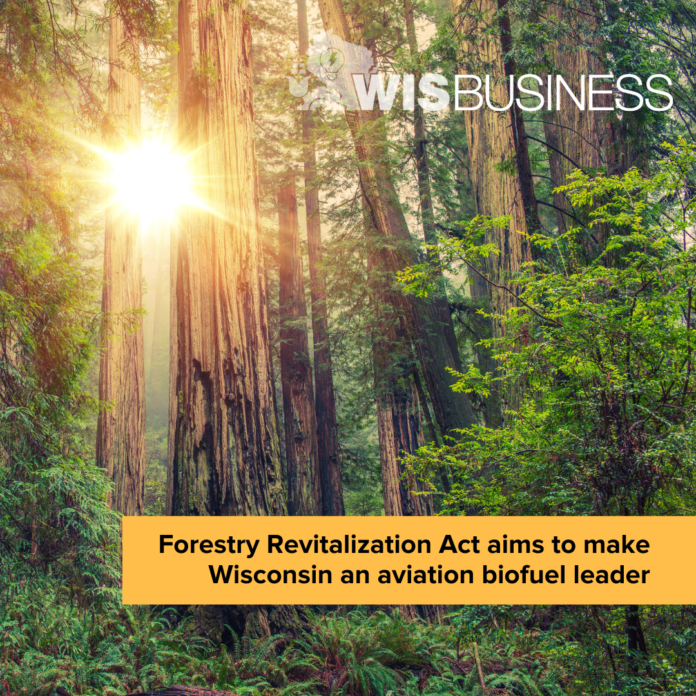A new Forestry Revitalization Act aims to make Wisconsin a global leader in aviation biofuel made from smaller, low-quality forestry biomass.
Northwoods Republican lawmakers introduced a bill that would spend $210 million in state assistance to help attract a $1.5 billion plant in Hayward. It would turn bark, branches, cutter shavings, tree tops, slash and forestry processing residue into fuel for airplanes.
Senate President Mary Felzkowski, of Tomahawk, during a press conference Monday morning said Wisconsin is competing with Michigan and Minnesota to attract a new business headquarters.
“There is a little bit of pressure to be the state that helps,” she said.
State Rep. Jeff Mursau, R-Crivitz, said the project would be a boost to a forestry industry that has taken a downtown after the closure of a paper mill in Wisconsin Rapids. Before that, the state had been harvesting 1.2 million cords. It’s now down to 839,000 cords, and the proposed project would add 440,000 cords to the annual harvest.
The project would be a partnership between Wisconsin-based Johnson Timber and Synthec Fuels, a German company with a Wisconsin subsidiary. It would be located on property adjacent to the Johnson Timber plant in Hayward, and the Wisconsin company would do the initial processing of the wood that would be turned into the sustainable aviation fuel.
The legislation calls for $60 million in WEDC Enterprise Zone Tax Credits and $150 million in state bonding that would be supported through the forestry account. Felzkowski said the plant would employ 150 people.
Felzkowski argued Wisconsin is primed to be a leader of sustainable aviation fuel as the market grows due to sustainable aviation fuel mandates in the European Union. The mandates require aviation fuel to be a 2% blend with sustainable aviation fuels in 2025, growing to 70% in 2050.
That means the EU would require over a trillion gallons of biofuel by 2050, Felzkowski added.
“So there is going to be an increasing demand for this type of fuel, and we are right at the forefront here in Wisconsin,” she argued.
The bill would also require Johnson Timber and Synthec Fuels to invest the $1.5 billion in the facility in the first five years, and that 80% of the biomass used to create the fuel come from Wisconsin.
Sawyer County Administrator Mark Markgren said the new plant would help bring demand back to the logging industry after several paper and pulp mills have shut down in the past few years.
“It would bring back the forestry industry and all the subsidiaries that would help, probably another 200 jobs at least. And all of those would be a living wage,” he said. “It would just be a huge economic boon for the local economy, which is suffering right now.”
Great Lakes Timber Professional Association Executive Director Henry Schienebeck praised the measure as both a way to bring jobs back and improve forest maintenance. Low quality timber biomass is not in demand, and a buildup of the material on the forest floor increases the risk of forest fires, he added.







